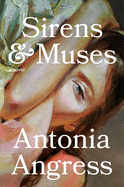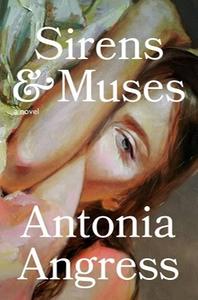
 Spoiled rich kids at a New England art college; self-professed anti-establishment types who film themselves eating and call it art; a washed-up artist taking temporary teaching positions and gobbling Xanax to get by--it sounds like the stuff of parody. Make no mistake: Sirens & Muses can be wickedly funny. But it's with a straight face that Antonia Angress has written her exceedingly good debut novel, a shrewd and expertly sustained rumination on what it takes to be a self-supporting artist and whether it's even worth it.
Spoiled rich kids at a New England art college; self-professed anti-establishment types who film themselves eating and call it art; a washed-up artist taking temporary teaching positions and gobbling Xanax to get by--it sounds like the stuff of parody. Make no mistake: Sirens & Muses can be wickedly funny. But it's with a straight face that Antonia Angress has written her exceedingly good debut novel, a shrewd and expertly sustained rumination on what it takes to be a self-supporting artist and whether it's even worth it.
Wrynn College of Art may have a multimillion-dollar endowment in the fall of 2011, but even with student loans and financial aid, sophomore Louisa Arceneaux, who hails from Breaux Bridge, La., is barely scraping by. Also burdensome is the guilt she feels about wanting to create something more borderless than what her mother calls her "Cajun art." Neither pangs of conscience nor money troubles beset Louisa's roommate, New Yorker Karina Piontek, which isn't to say that Karina doesn't have problems. She knows that people are still talking about what happened to her the previous semester and, as the fall semester begins, she learns that her art-collector parents are divorcing.
Karina's sort-of boyfriend, Wrynn senior Preston Utley, is idealistic--"He believed the gallery/museum industrial complex was corrupt and outdated"--but clueless about what to do after graduation. In the meantime, he keeps posting on The Wart, his Photoshopped-image blog, which everyone at Wrynn follows. (A typical post: "Christ the Redeemer standing in a McDonald's PlayPlace ball pit (McMass).") At his Visiting Artist q&a, Robert Berger isn't thrilled when Preston, one of his students, insists that "you guys--the elites, the gatekeepers--are afraid of the Internet." And yet Robert can't deny that there's something familiar about Preston's irreverence; he himself achieved much of his glory-days fame from his painting of a debauched Nancy Reagan.
Sirens & Muses follows each of these four individuals, gradually laying out their damage, finessing the relationships that exist among them, and otherwise rounding out their characters. The novel's plot is gripping--it includes a hoax and a filched Egon Schiele drawing--but equally intriguing are the questions Angress's characters ask themselves: How important is it to resist the art market's capitalist trappings? When does political art become propaganda? How does one know if committing oneself to the creative life is the right choice? Angress, of course, need not wonder. --Nell Beram, author and freelance writer
Shelf Talker: This dazzler of a debut novel tracks four striving and struggling artists--three students and a middle-aged professor--at a renowned New England art college.

